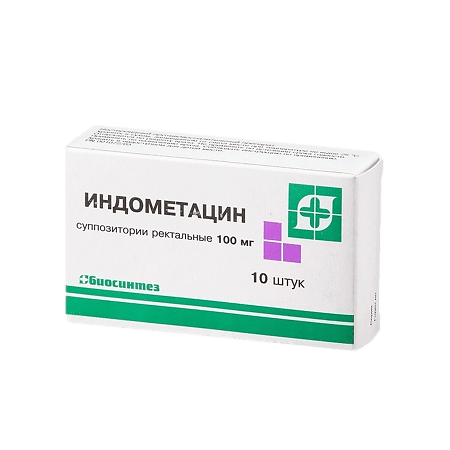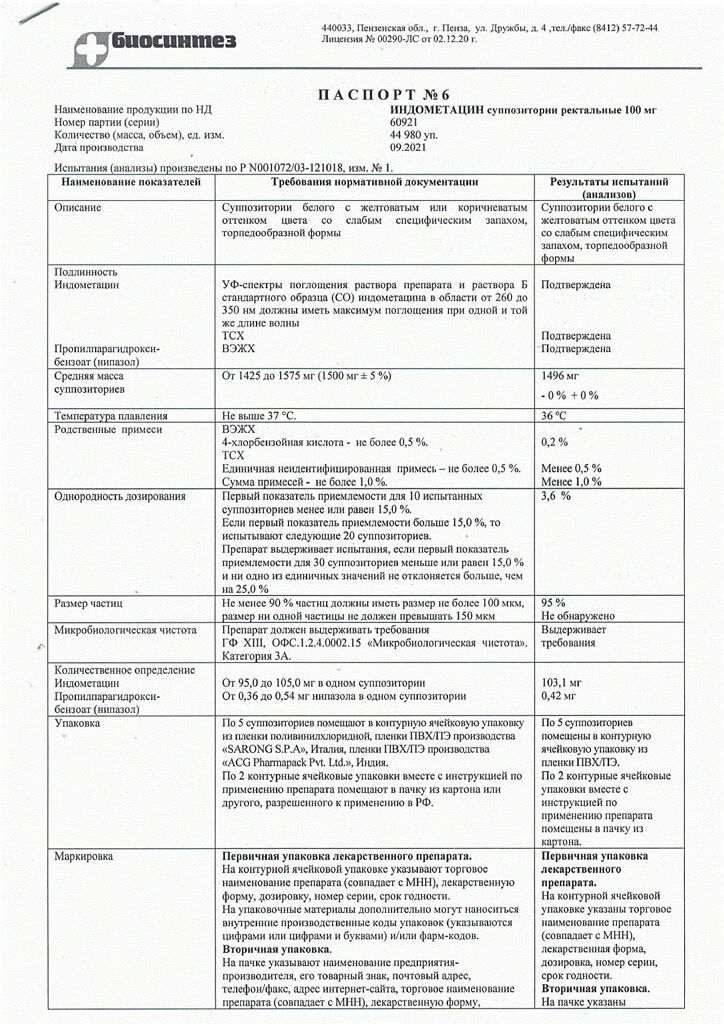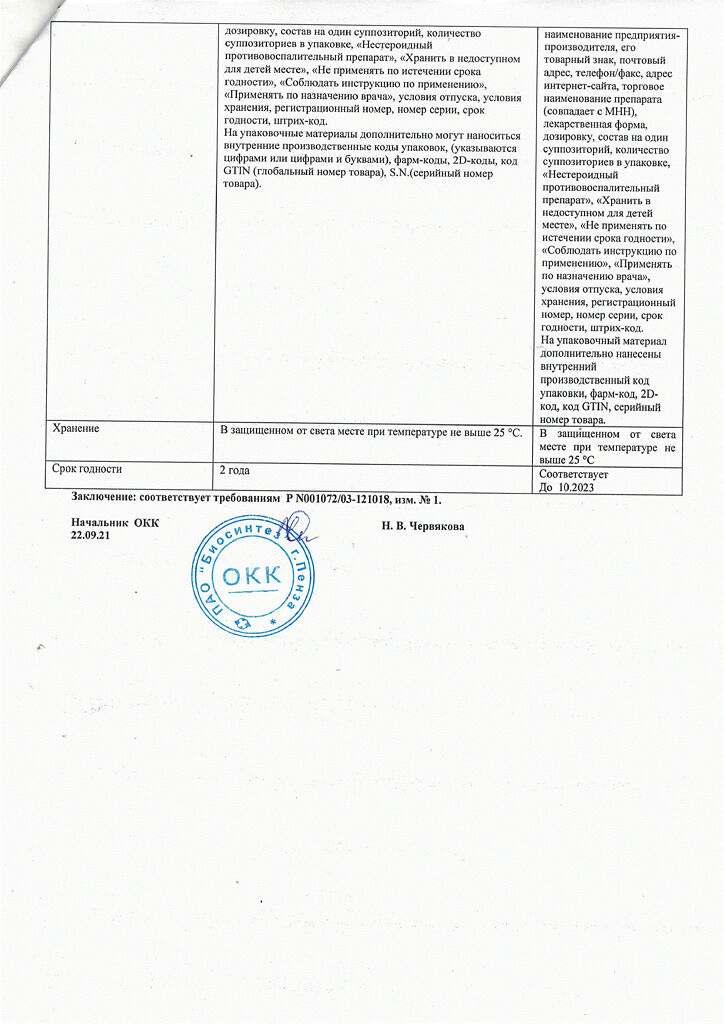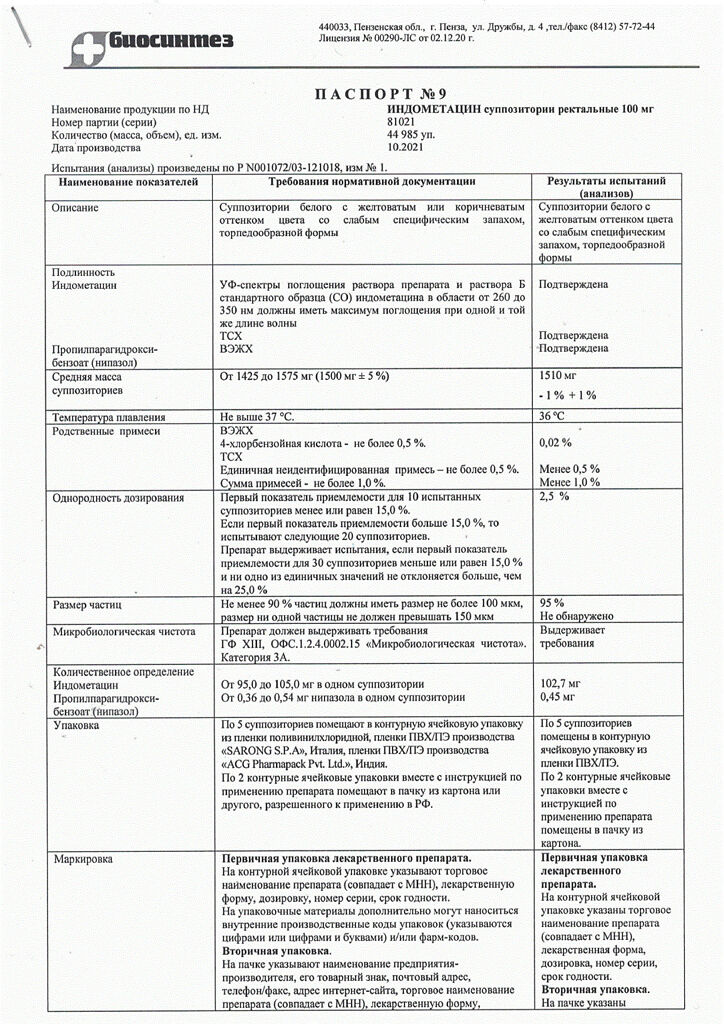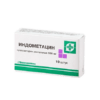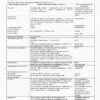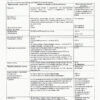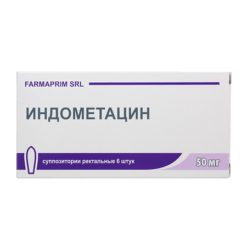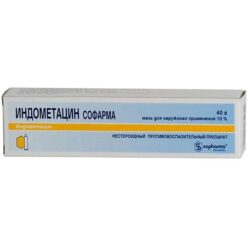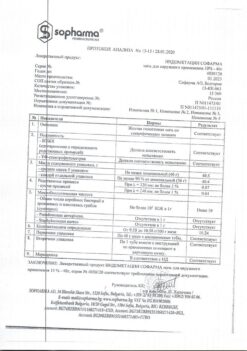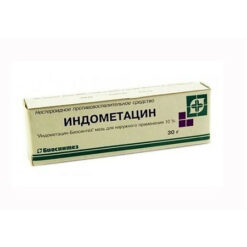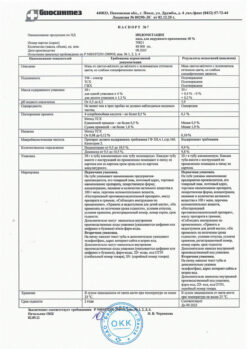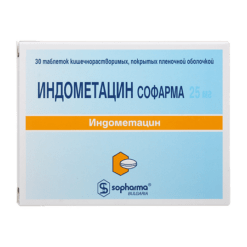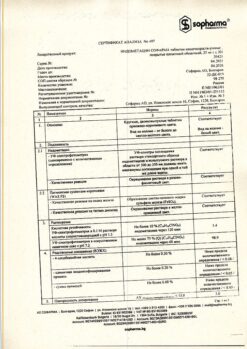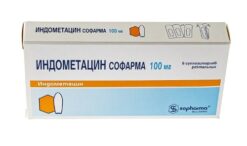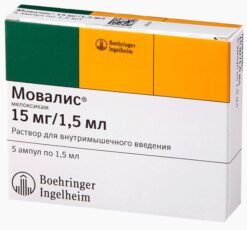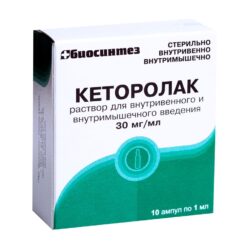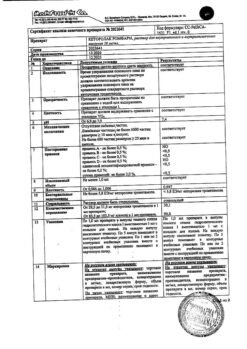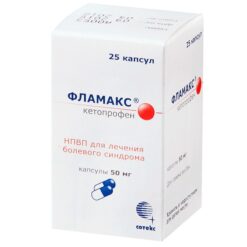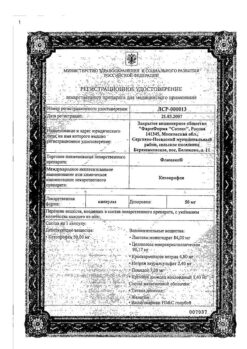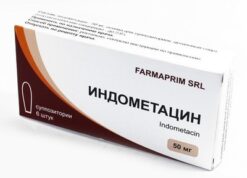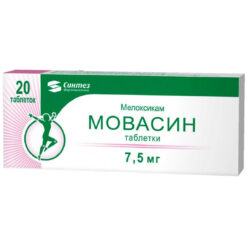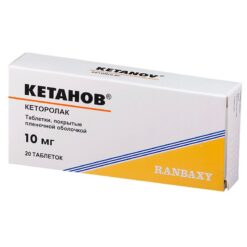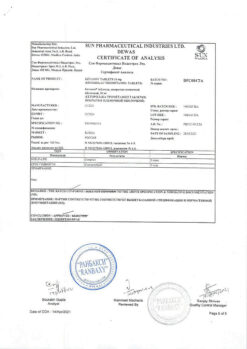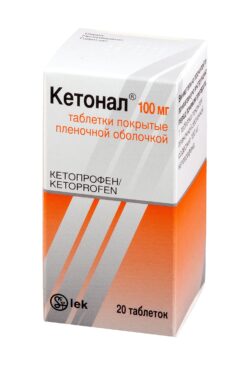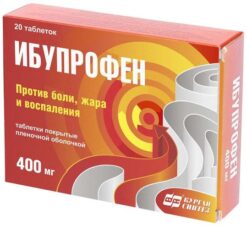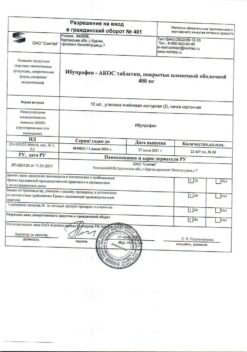No products in the cart.
Indomethacin, rectal, 100 mg 10 pcs
€3.83 €3.00
Description
Indomethacin has anti-inflammatory, analgesic, antipyretic and antiaggregant effect. Inhibits the activity of pro-inflammatory factors, reduces platelet aggregation.
Inhibiting cyclooxygenase 1 and 2 it disrupts arachidonic acid metabolism, decreases quantity of prostaglandins (Pg) both in inflammatory focus and healthy tissues, suppresses exudative and proliferative phases of inflammation.
It causes easing or disappearance of pain syndrome of rheumatic and non-rheumatic character (including pain in the joints). In case of pain in the joints at rest and on movement, decreases morning stiffness and joint swelling, increases the range of motion; in inflammatory processes after operations and injuries it quickly relieves spontaneous pain as well as pain on movement, reduces inflammatory swelling of the wound area.
Indications
Indications
Inflammatory and degenerative diseases of the musculoskeletal system: rheumatoid, psoriatic, juvenile chronic arthritis, arthritis in Paget’s and Reiter’s disease, neuralgic amyotrophy (Personage-Turner disease), ankylosing spondylitis (Bechterew’s disease), gouty arthritis (in case of an acute attack of gout, fast-acting dosage forms are preferred), rheumatism.
Pain syndrome: headache (including menstrual syndrome) and toothache, lumbago, sciatica, neuralgia, myalgia, after injuries and surgical interventions, accompanied by inflammation, bursitis and tendonitis (most effective when localized in the shoulder and forearm).
Algodismenorrhea; Bartter’s syndrome (secondary hyperaldosteronism); pericarditis (symptomatic treatment); childbirth (as an analgesic and tocolytic agent); inflammatory processes in the pelvis, incl. Adnexitis.
Non-closure of the ductus botallus.
Infectious and inflammatory diseases of the ENT organs with severe pain syndrome (as part of complex therapy): pharyngitis, tonsillitis, otitis media.
Feverish syndrome (including with lymphogranulomatosis, other lymphomas and hepatic metastases of solid tumors) – in case of ineffectiveness of ASA and paracetamol. The drug is intended for symptomatic therapy, reducing pain and inflammation at the time of use, and does not affect the progression of the disease.
Pharmacological effect
Pharmacological effect
Indomethacin has anti-inflammatory, analgesic, antipyretic and antiplatelet effects. Suppresses the activity of pro-inflammatory factors, reduces platelet aggregation.
By inhibiting cycloxygenase 1 and 2, it disrupts the metabolism of arachidonic acid, reduces the amount of prostaglandins (Pg) both in the site of inflammation and in healthy tissues, and suppresses the exudative and proliferative phases of inflammation.
Causes a weakening or disappearance of pain syndrome of a rheumatic and non-rheumatic nature (including pain in the joints at rest and during movement, a decrease in morning stiffness and swelling of the joints, helps to increase the range of movements; in inflammatory processes that occur after operations and injuries, quickly relieves both spontaneous pain and pain during movement, reduces inflammatory swelling at the wound site).
Active ingredient
Active ingredient
Indomethacin
Composition
Composition
Active substance:
Contraindications
Contraindications
Hypersensitivity;
bronchial asthma, urticaria or acute rhinitis, provoked by taking ASA or other NSAIDs;
peptic ulcer of the stomach and duodenum, inflammatory bowel diseases (ulcerative colitis, Crohn’s disease), bleeding (including intracranial, from the gastrointestinal tract), congenital heart defects (severe coarctation of the aorta, pulmonary atresia, severe tetralogy of Fallot), period after coronary artery bypass grafting;
bleeding disorders (including hemophilia, prolonged bleeding time, bleeding tendency), liver failure, active liver disease;
CRF (creatinine clearance less than 30 ml/min), progressive kidney disease, hematopoietic disorders (leukopenia and anemia); confirmed hyperkalemia;
pregnancy, lactation period;
for rectal use – rectal bleeding, proctitis, hemorrhoids, children (up to 14 years).
With caution. IHD, cerebrovascular diseases, CHF, dyslipidemia, hyperlipidemia, diabetes mellitus, thrombocytopenia, diabetes mellitus, peripheral arterial disease, arterial hypertension, smoking, chronic renal failure (creatinine clearance 30-60 ml/min), liver cirrhosis with portal hypertension, hyperbilirubinemia, history of ulcerative lesions of the gastrointestinal tract, presence of H. pylori infection, long-term use of NSAIDs, frequent alcohol consumption, severe somatic illnesses; concomitant therapy with the following drugs: anticoagulants (including warfarin), antiplatelet agents (including acetylsalicylic acid, clopidogrel), oral corticosteroids (including prednisolone), selective serotonin reuptake inhibitors (including citalopram, fluoxetine, paroxetine, sertraline);
mental disorders, epilepsy, parkinsonism, depression, old age.
Side Effects
Side Effects
From the digestive system: nausea, anorexia, vomiting, pain and discomfort in the abdomen, constipation or diarrhea, erosive and ulcerative lesions, bleeding and perforation of the gastrointestinal tract; rarely – intestinal strictures, stomatitis, gastritis, flatulence, bleeding from the sigmoid colon or from a diverticulum, jaundice, hepatitis.
From the central nervous system and peripheral nervous system: dizziness, headache, depression, feeling of fatigue; rarely – anxiety, fainting, drowsiness, convulsions, peripheral neuropathy, muscle weakness, involuntary muscle movements, sleep disorders, mental disorders (depersonalization, psychotic episodes), paresthesia, dysarthria, parkinsonism.
From the cardiovascular system: edema, increased blood pressure, tachycardia, chest pain, arrhythmia, palpitation, arterial hypotension, congestive heart failure, hematuria.
Allergic reactions: rarely – itching, urticaria, angiitis, erythema nodosum, skin rash, exfoliative dermatitis, Stevens-Johnson syndrome, erythema multiforme, toxic epidermal necrolysis, hair loss, acute respiratory distress, sharp drop in blood pressure, anaphylactic reactions, angioedema, dyspnea, bronchial asthma, edema lungs.
From the hematopoietic system: rarely – leukopenia, petechiae or ecchymosis, purpura, aplastic and hemolytic anemia, thrombocytopenia, disseminated intravascular coagulation syndrome.
From the senses: rarely – impaired clarity of visual perception, diplopia, orbital and periorbital pain, tinnitus, hearing impairment, deafness.
From the urinary system: rarely – proteinuria, nephrotic syndrome, interstitial nephritis, renal dysfunction, renal failure.
From the side of metabolism: rarely – hyperglycemia, glucosuria, hyperkalemia.
Other: rarely – vaginal bleeding, hot flashes, increased sweating, nosebleeds, enlarged and tense breasts, gynecomastia.
Local reactions: at the site of intramuscular injection in some cases – formation of infiltrate, abscess; When administered rectally, irritation of the rectal mucosa, tenesmus, and exacerbation of chronic colitis are possible.
For external use: itching, redness, rash at the site of application.
Interaction
Interaction
With simultaneous use, indomethacin can reduce the effects of saluretics and beta-blockers; enhance the effects of indirect anticoagulants.
With the simultaneous use of indomethacin and diflunisal, there is a risk of severe bleeding from the gastrointestinal tract.
When used simultaneously with probenecid, an increase in the concentration of indomethacin in the blood plasma is possible.
Indomethacin may reduce the tubular secretion of methotrexate, resulting in increased toxicity.
When used simultaneously with NSAIDs, the toxicity of cyclosporine increases.
Indomethacin at a dose of 50 mg 3 times a day increases the concentration of lithium in the blood plasma and reduces the clearance of lithium from the body in patients with mental illness.
With simultaneous use of indomethacin with digoxin, it is possible to increase the concentration of digoxin in the blood plasma and increase the half-life of digoxin.
Manufacturer
Manufacturer
Biosynthesis, Russia
Additional information
| Manufacturer | Biosintez, Russia |
|---|---|
| Medication form | rectal suppositories |
| Brand | Biosintez |
Other forms…
Related products
Buy Indomethacin, rectal, 100 mg 10 pcs with delivery to USA, UK, Europe and over 120 other countries.

